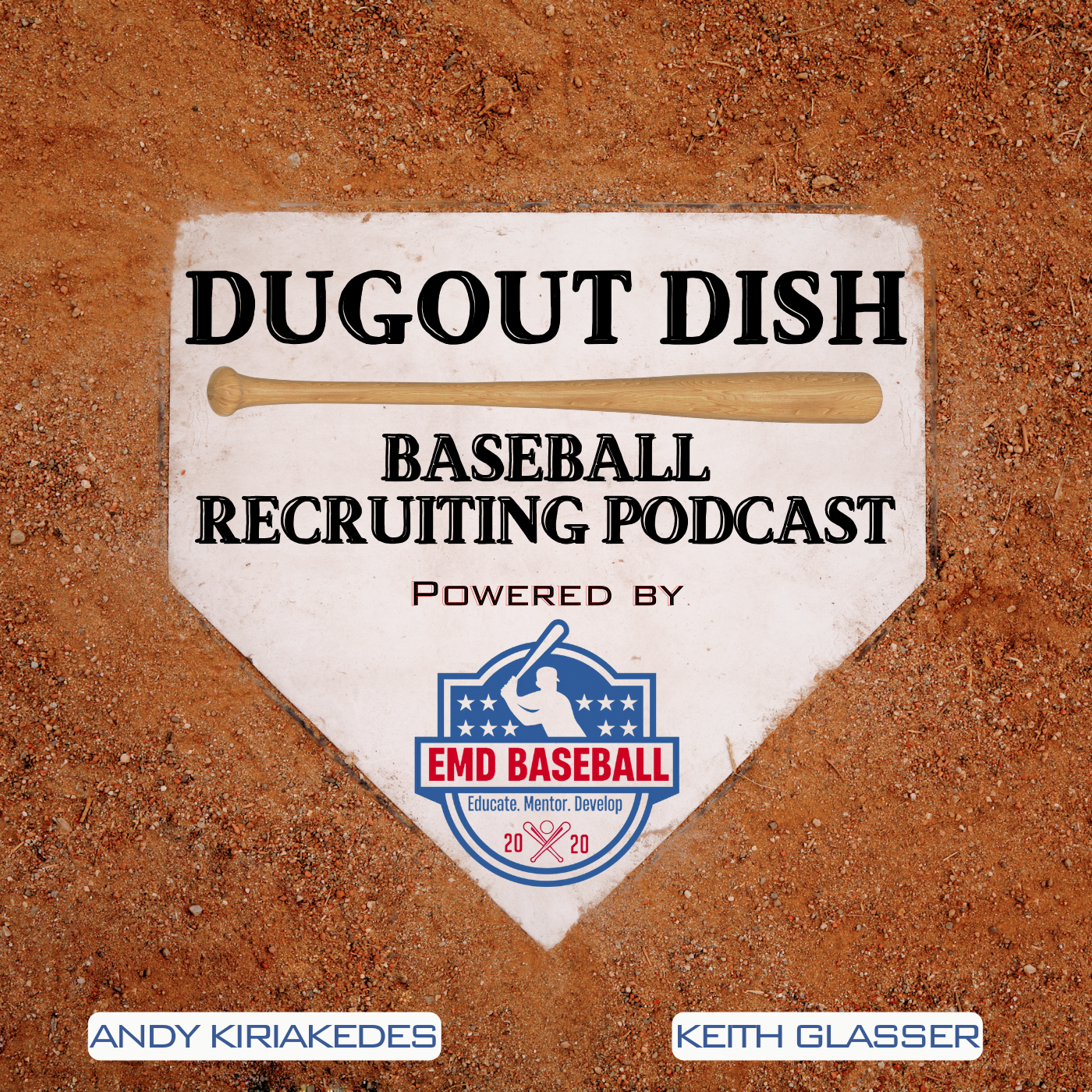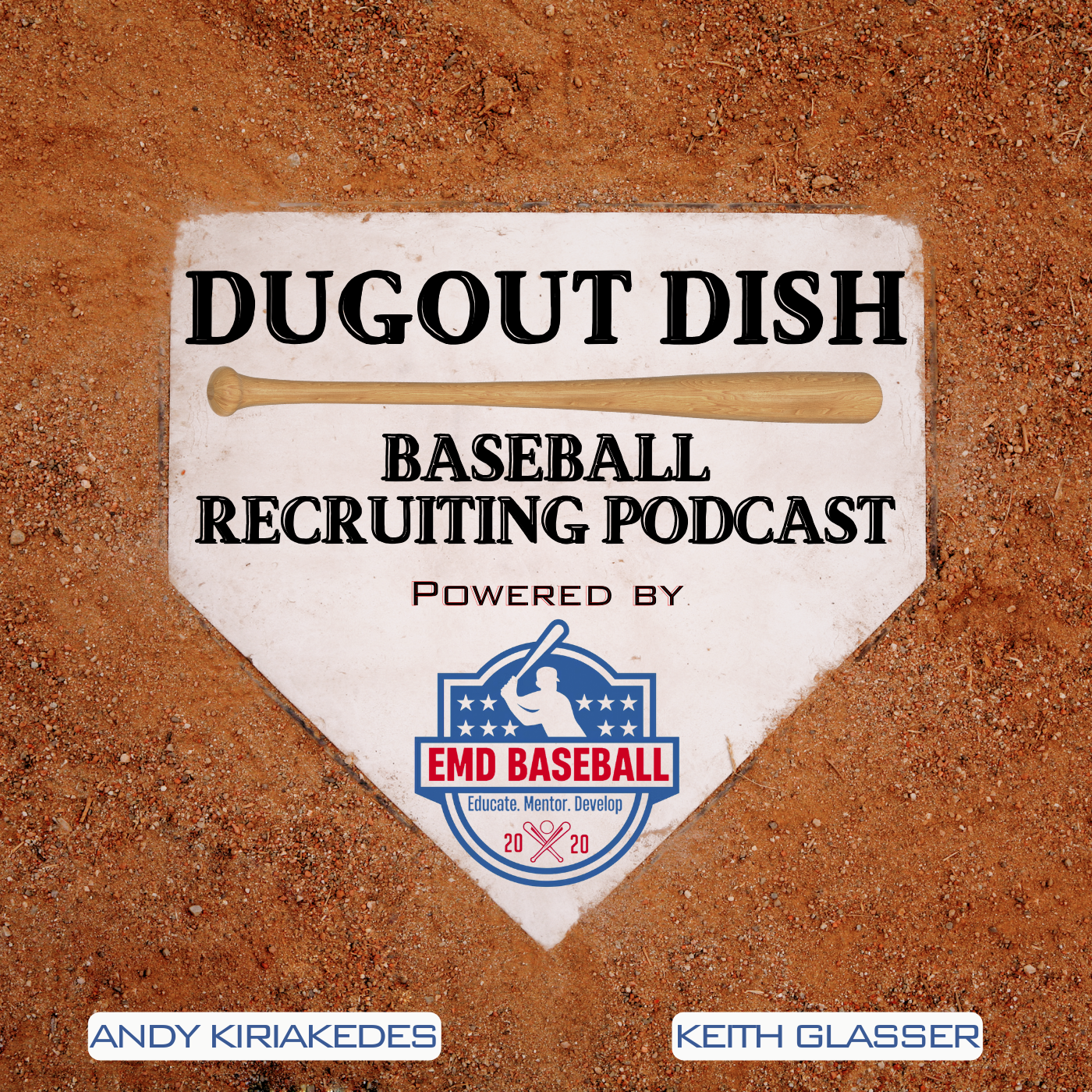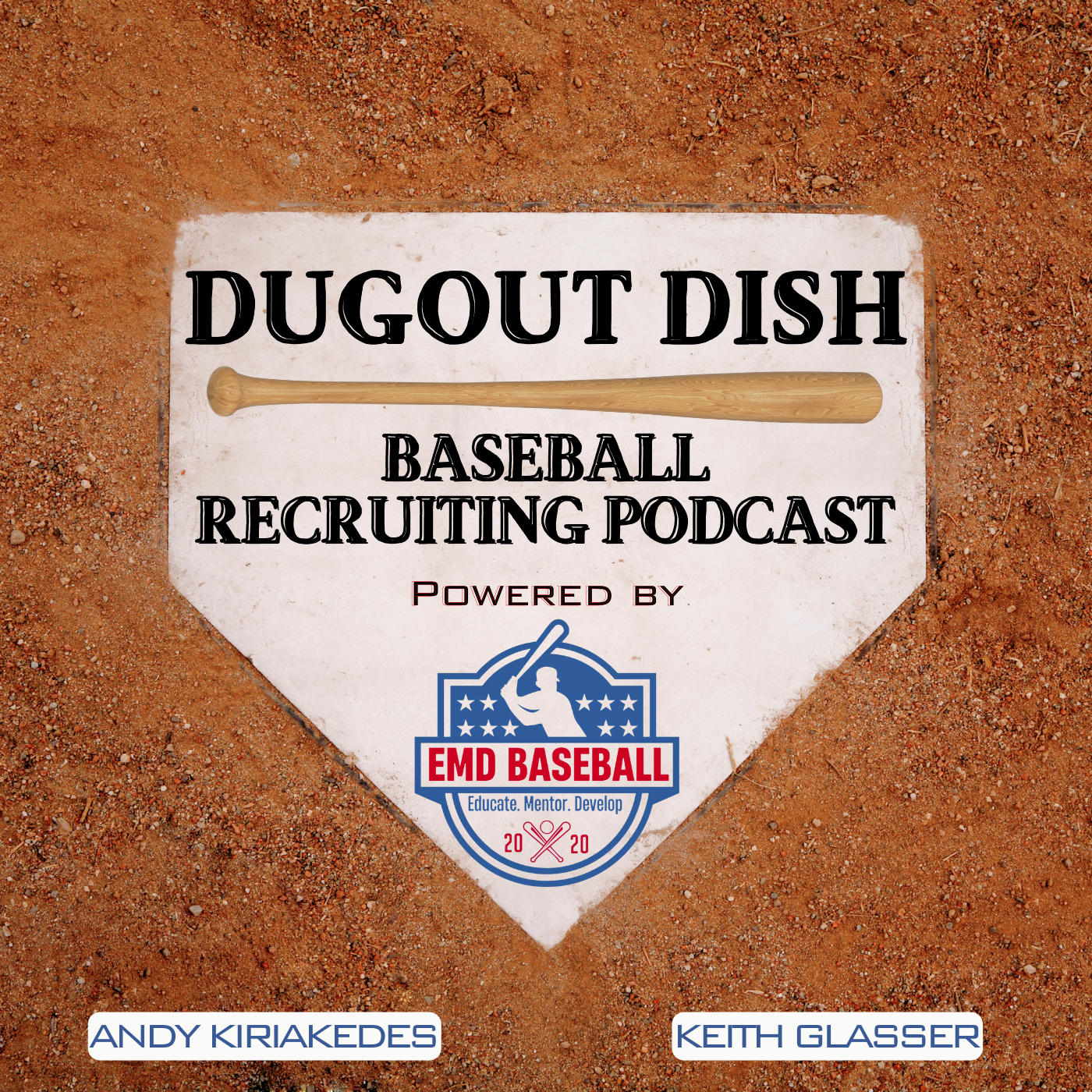Episode Transcript
[00:00:00] Speaker A: Foreign.
[00:00:11] Speaker B: Welcome to this week's edition of in the Clubhouse with EMD Baseball. I'm Andy Kirikidis, joined by my wonderful co host Keith Glasser. How we doing?
[00:00:19] Speaker A: Great. How are you?
[00:00:20] Speaker B: Good topic for today and I think this is a good one. As the, the summertime approaches here and this specifically relevant for 26 is definitely relevant for 27's year. But I think often what happens is a lot of times players and families rely solely on their travel ball schedule as their recruiting platform.
And I think it's really important for people to identify other ways to get yourself in front of the coaches that you're trying to get in front of. Right.
So what can you do in addition to your travel schedule? What can you supplement on campus camps, showcases, workouts?
Not all of these tournaments are necessarily conducive to get recruited, depending on what you're looking to be recruited as or where you fall in the grand scheme of things. Right. One of the things I always go to is, you know, Georgia is always a really popular thing. Right. And it's often a selling point for travel programs.
You know, going down to the perfect game or the PBR.
If you're a Northeast kid, Division 1 player, Division 3 player, I don't know if it really matters that much anymore.
Going down to Georgia likely isn't going to get you in front of a lot of the schools that you're probably trying to get in front of.
And I think it's important to understand that that tournament can be really fun and can be great.
But if you're a kid who's getting or is looking to stay in the Northeast, a lot of those Northeast schools don't go down there anymore because they're just seeing the teams that they would normally see.
So is there something instead of a tournament like that? Or if you're going to Hoover, Alabama and you have no interest in playing in, you know, the, the Midwest or kind of the Southeast and you're trying to play in a different region, a lot of the schools that aren't from that direct region, they're not going to be there.
And being smart about where you're going and understanding that your travel schedule in a lot of cases likely isn't going to meet all your needs.
So taking the time to map out other ways to get yourself in front of these coaches and I think there's a variety of ways to do it with on campus camps and really targeting some schools that you like, there's some showcases that do a really good job to get you in front of a lot of guys. But I think it's really important for players and families to evaluate their travel schedule.
Make sure that you've identified any time gaps where you can go and get in front of coaches.
And you got, especially if you're a 26, you got to look out for number one right now. And if not going to Georgia gets you in front of 10 or 15 coaches because you decide to go to the two on campus camps during that window of schools that you know you're interested in or you know that are interested in you, I would argue that the experience down in Georgia isn't going to be better for you than actually putting yourself in front of people that are going to evaluate you. I think this is particularly important for players that are more likely Division 3 players.
There's not many Division 3 programs that are traveling down to Georgia to go and watch. Right. You're going to have your more local stuff. But know the Division 3 schools in Pennsylvania, New Jersey and New York and New England, they're not flying down to Georgia. There's very few of them that do. And they're very niche programs that go down there because they recruit nationally. But you know, even most of the high academic division threes, they're not flying down to Georgia. They're going to stay, they're going to have their own on campus camps, they're going to be going to workouts where there's high academic kids.
So being smart about that I think is really, really important. Because if you're at 26, trying to get recruited right now, you got about a four month window that you really need to take advantage of and you don't have time to waste it traveling and spending money to go to places that may not be all that fruitful for you.
[00:04:27] Speaker A: Yeah, and I think the, the easiest way to find that out is to ask, right?
Like ask the coaches that you're interested in from a program standpoint and who are interested in you.
You know, where are you going to be?
You know, and if they're not going to be down in Georgia, then that can start to frame where it is that you're going to go and what you're going to do.
You know, I think the, the Georgia thing, especially over the course of the last couple years, the rule changes that we've talked about ad nauseam on here, it really has kind of reshaped what that, that tournament is. It's still, it's a good tournament and it's, it's an experience.
But on the same hand, from a recruitment Standpoint, it might not be the best for what it is you're looking to do. And for some people, it will be. Right. Like, let's be very clear, for some people, it will be the right decision to make and go do and get in front of coaches and be seen. But you need to understand where you are in your process and what you're doing. And to your point, you know, the vast majority of division threes aren't going down there. You know, Are there some. Yeah, you know, like, you know, I.
That, you know, I know Case goes down there from Coast Guard, but it's Coast Guard, so he has to. Right. Like, you know, when I was at rpi, I didn't go down to Georgia. It wasn't an event that I went to, you know, so I. I think that being smart about, you know, and. And asking where guys are going to be at is. Is just as good as in. Is far better than guessing. Right. You know, so. So ask that question first and then decide whether or not that's going to be for you and then figure out what it is that you need to get into from a scheduling standpoint so that you can find the camps. It is that you. You should be going to or clinics or whatever it might be to get you in front of the coaches. It is that you want to be in front of.
[00:06:17] Speaker B: Yeah, this is.
It's kind of crunch time. Right. It's not panic time, but you got to be smart with your time.
And you make a great point that each individual case is different. Like, every single player's path to getting recruited is going to be different. And you have to have an honest look at where you fit, schools that you're targeting, schools that are interested in you, and make sure that you're doing the best that you can to get in front of those schools.
And there's some.
There's some guys that are going to go and play in some of these big tournaments, and it's not going to be the best fit for them. And I always come back to the academic portion of it, right. The high academic world and just being really smart about making sure you're getting in front of the right guys.
But I think it goes for everybody. And this is. This is the hard part to tease through sometimes is figuring out where you fit in this whole process and what's going to be productive for you. But I know it's something that we talk about with the families that we work with, is really getting down to the nitty gritty of what you want out of this and where you want to be, and then putting together a plan to make sure that you get in front of the right coaches, that you give yourself an opportunity to be seen by the schools that you're interested in. Because the reality is, is that not all of these guys are going to show up to go and watch one guy. So at some point you probably have to make an effort to get in front of them and not count on them coming to you, which is, you know, that's the reality for most kids.
So take the time to map this out.
Take the time to have an honest discussion about what's important to you.
Identify those schools that are going to be a fit, and then you have to take your summer ball schedule and go, all right, we have a gap here, we have a gap here, we have a gap here. This tournament might not be a good fit for us. And then you got to go find ways to fill that gap and make that mid June to mid August time period, that eight week window. It needs to be as productive as possible.
[00:08:19] Speaker A: Yeah, I think that's the, the biggest part, right? Like the, there are all these big tournaments all over the country that you can and have been the, the sexy option to go to. And I don't necessarily know if it's, if it's the best option for everyone. When you can find, you know, other opportunities to be in front of the coaches, it is that you want to be in front of. And I think that you, you know, you, you hit it on the head at the start of, you know, you need to put number one first and understand that like, this is your process and you really only get one go at this. So you want to make sure that you're filling those gaps in your, your, your summer schedule with events that are going to get you in front of the coaches you want to. And you might have to make hard decisions on whether or not you should go to, you know, one event over another.
You know, and we, these are hard conversations we have with families. You know, we have one that I actually just saw this weekend who, you know, had to, we had to have that conversation last year about not going to a place that all the schools that he was being recruited by weren't going to be at and going to a place that all the schools that were recruiting him were going to be at and ultimately ended up working out for him because he made the decision to go to the place where all the schools were going to be at to see him throw, you know, so it's, it's not, they're not one off things, you know, and I think it can be a hard conversation and hard to do, but at the same time, if this is what you want to do in order to get in front of these coaches, you might have to make some hard decisions to do some of those things.
But it's understanding, you know, what that looks like. And I think for me, it goes back to the start where I said, just ask the question, right? Like, you know, hey, coach, are you going to be in Georgia? Like, no, we're not going to be there. We're going to be at these three events. You know, I'm going to be at X camp. My assistant's going to be at this camp, and my other assistant is going to be at this tournament, and those are the three events we're going to be at. When you're down there, like, we're not going to be able to see a play, you know, if you're going to go, let us know how you do. If you're not going to be there and you're going to be somewhere else, let us know so we can get eyes on, you know, and it, it makes it, you know, it makes the communication a lot easier. And I think on the other hand, it shows that you're, you know, you're willing to do some things to get in front of coaches to achieve the goal it is that you've set out to do on the front end, you know, so. And it's far different to me than, you know, the just choosing to not play. Like you're choosing to get in front of some coaches that want to, you know, ultimately recruit you and see you. And you got to be where they are. They can't recruit you if they're not going to, you know, at the very least be able to see you once or twice and make a decision on what you can do in game, you know, so it's making those decisions to get in front of those guys so that you can. You can ultimately be recruited at those programs.
[00:11:02] Speaker B: I think the. I got two things that I want to add that, because I think we covered the topic, but I think these are other two things that need to be said regarding this.
One, do your homework on the travel team that you're going to play for, right? And have these conversations with that coach. Get an understanding of what their schedule is, right. There's teams that don't do those big tournaments that are really, really successful at placing players in college programs because they do really targeted stuff. They go to team camps, they go to More local tournaments. They'll be in Diamond Nation. They'll be up in Boston for the Boston Open. Right. Get an idea of what their schedule is and try to overlay where you fit in the grand scheme of things. And that's. Is that schedule going to be conducive? The other piece is that if you do decide, hey, I got to do some other stuff outside of my schedule, Communicate with the coaches and the people who run that organization early and often.
Most of these guys, the vast majority of these guys, want kids to find a place to play college baseball. And if you communicate with them openly and honestly and ahead of time and you don't put them in a bad spot where you're a pitcher and you're supposed to throw on Friday and you call that guy on Wednesday afternoon and say, hey, I'm not coming this weekend. I'm going to another camp.
That's grounds to be a little bit frustrated if you're one of the coaches on that organization. But if you sit them down two or three weeks in advance, you say, hey, coach, listen, I'm getting some interest from this school.
I really want to go to their camp. I think it's an opportunity for me to get in front of them.
I'm going to go to this camp this weekend. I'm not going to be there on that Friday and that Saturday. I'll be there on Sunday.
Coaches generally going to be pretty flexible, this kind of stuff, and they're going to work with you to make sure that you get the most out of your summer.
But if you don't communicate, you put yourself in a situation where you're. You're not doing good by the people that are trying to help you. So make sure you communicate. Make sure you have these conversations with those people.
They should be understanding. If they're not, that's a red flag. But if you put them in a situation where you tell them super late that something's happening, not the best way to go about it. Make sure you communicate early and often in order to do this the right way.
[00:13:27] Speaker A: Nailed it.
[00:13:29] Speaker B: Anything else you want to add?
[00:13:30] Speaker A: Nope.
[00:13:31] Speaker B: All right, put together a plan and execute it.
Check in next week. We'll talk to you then. Thanks, everybody.
Thank you for listening this week. If you're watching on YouTube, go ahead and hit that subscribe button and smash that like button for us. Check us out on Apple Podcasts, Google podcasts, as well as Spotify. You can follow us on Twitter and Instagram MDBaseball. If you want to find out what me and Keith do to help families and players navigate the recruiting process.
Go ahead and check us out on emdbaseball.com take a few minutes to check out our new online academy. I promise you'll get some good information out of that. Thanks again for listening. Check in with you next week.


